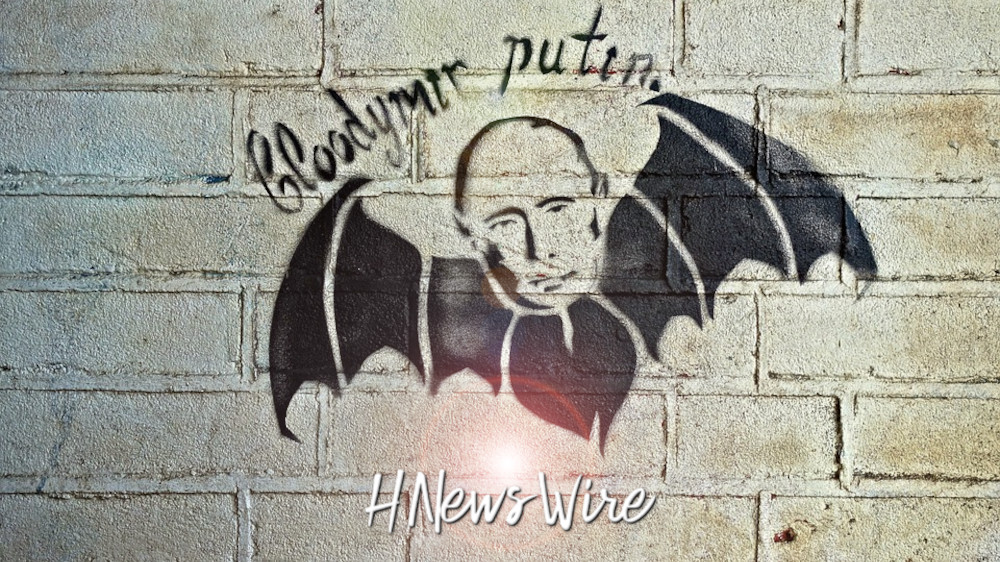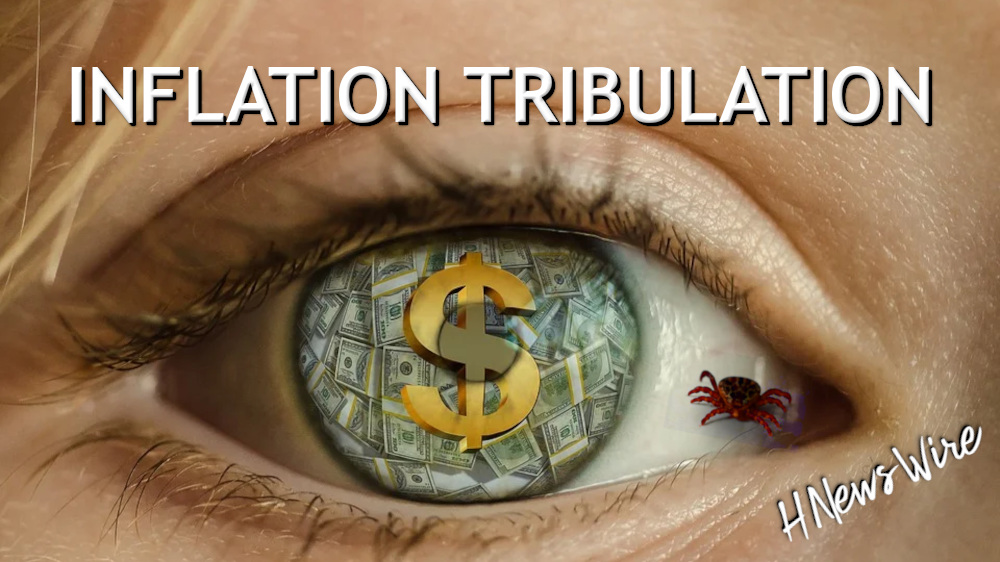The NEW WORLD ORDER Is Taking Shape: The Movement for Central Bank Digital Currencies (CBDC) “Is Gathering Steam, Fueled by Central Bank Inventiveness
![]()
HNewsWire- As a bombardment of Western sanctions wreak havoc on Russia's economy, some are considering new methods to avoid future US economic restrictions. According to Lewis McLellan, the digital editor of the Official Monetary and Financial Institutions Forum's (OMFIF) Digital Monetary Institute, one possible weapon for defanging future penalties is central bank digital currency (CBDC) networks:
Across Asia, networks of cross-border central bank digital currencies are being developed (like the mCBDC Bridge, which involves Thailand, Hong Kong, China and the United Arab Emirates). Russia's central bank is developing a digital rouble, and Governor Elvira Nabiullina has indicated interest in the currency's potential for enabling cross-border transfers, notably with China.
A large and unexpected new shift might soon affect the fortunes of thousands, while leaving the majority of people less off than they were before. Additional Information
Additionally, the digital yuan might be put into service. It is widely recognized across China and is likely to be accepted by anybody having expenses or responsibilities in the country. Even dollar stablecoins, which are gaining popularity and size, might help form the backbone of a payments network that cannot be shut down by denying access to Swift or the Federal Reserve's clearing system. There is no proof that China plans to assist Russian enterprises in evading sanctions — and if they do, they will almost certainly face their own — but if the dollar payments network becomes an instrument of foreign policy, it creates a fresh feeling of urgency for some to establish an alternative.
Beijing Expands Public Yuan Testing
The digital renminbi is the first CBDC to be issued by a major economy's central bank and has being publicly tested since April 2021. China has conducted CBDC testing in eleven cities and areas so far (Shenzhen, Suzhou, Chengdu, Xiong'an, Shanghai, Hainan, Changsha, Xian, Qingdao, and Dalian). According to Chinese state-owned financial news source Securities Times, Beijing is on the approach of conducting trials of its digital yuan currency in a third set of cities and provinces, including Henan, Fujian, and Heilongjiang, as well as Guangzhou, Chongqing, Fuzhou, and Xiamen.
Since 2014, China's central bank has been investigating the possibilities presented by digital currencies. Among these possibilities are lower operating costs, better efficiency, and "a broad variety of innovative uses," said to Fan Yifei, a PBOC deputy governor in 2016. A year later, the People's Republic of China's State Council approved the creation of the digital RMB. Commercial banks, as well as Chinese technology heavyweights Tencent, Alibaba, Huawei, JD.com, and UnionPay, were asked to join in the initiative.
Josh Lipsky, a former IMF official who is now at the Atlantic Council, a powerful US think tank, has subsequently identified the digital yuan as a "national security risk" endangering the US currency. Yet the People's Bank of China is not an exception when it comes to experimenting with or testing a digital currency upgrade.
There are now 87 central banks operating in countries accounting for 90% of global GDP, including the Federal Reserve, the European Central Bank, the Bank of Japan, and the Bank of England. The Reserve Bank of India has declared that in the next fiscal year, it would implement a digital rupee (April 2022 to March 2023). Three CBDCs have officially launched in the last two years: the so-called DCash in the Eastern Caribbean, the Sand Dollar in the Bahamas, and the eNaira in Nigeria, all of which have had a very muted influence so far, according to the technology news website Tech Monitor:
Almost immediately after its introduction, customers complained about the app's lack of functionality, and the app was momentarily removed from the Google Play Store to allow for changes. Only 694,000 eNaira wallets have been downloaded as of January (the e-Yuan, by contrast, remains in its pilot stage but boasts some 260 million users). Spending also remained modest, with transactions totaling $450,000.
IMF Consistently on Board
As one would expect from the world's most powerful supranational financial organization, the International Monetary Fund (IMF) is extensively engaged in this process, notably by offering technical help to a number of its members. Last month, speaking at an Atlantic Council event, IMF President Kristalina Georgieva emphasized the potential advantages of CBDCs while praising central banks' "ingenuity":
We have progressed beyond theoretical talks about CBDCs and are currently in the experimental phase. Central banks are donning their aprons and studying the bits and bytes of digital money.
CBDCs are still in their infancy, and we have no idea how far or how quickly they will go. What we do know is that central banks are strengthening their ability to harness new technologies—in order to be prepared for whatever may come next.
CBDCs, if constructed responsibly, have the potential to provide more resilience, security, availability, and cost savings than private forms of digital money. That is absolutely true in comparison to unbacked crypto assets, which are inherently volatile. Furthermore, even the most well-managed and controlled stablecoins may fall short of a stable and well-designed central bank digital currency.
We know that the transition to CBDCs is gaining traction, owing to the inventiveness of Central Banks.
Around 100 nations are now investigating CBDCs on some degree. Some are doing research, some are conducting testing, and a few are actually dispensing CBDC to the general population.
The Sand Dollar, the local CBDC, has been in circulation in the Bahamas for more than a year.
Sweden's Riksbank has produced a proof of concept for CBDC and is investigating its technological and policy implications.
In China, the digital renminbi [dubbed e-CNY] continues to grow in popularity, with over a hundred million users and billions of yuan in transactions.
And, just last month, the Federal Reserve released a study stating that "a CBDC has the potential to fundamentally alter the structure of the United States financial system."
As could be expected, the IMF is extensively engaged in this subject, offering technical help to a number of its members. A critical purpose for the Fund is to facilitate experience sharing and to foster CBDC interoperability.
A Peso Digital?
Even nations where cash remains undisputedly king of the payments environment are scrambling to implement a CBDC. El Paz released an article (in Spanish) headlined "Is Mexico Prepared for a Central Bank Digital Currency?" three days ago. The article starts by examining recent efforts by Mexico's central bank, Banco de Mexico (Banxico), to investigate the prospect of introducing a digital peso as early as 2024:
Othón Moreno, the central bank's head of policy and research for payment systems and market infrastructure, recently said at a cryptocurrency seminar that there is a need for stable currencies (dubbed stablecoins) and that various central banks are now examining the issuing process. "Historically, central banks have successfully issued their legal tender currencies. We have confined ourselves to doing it physically, but I believe it demonstrates that the technology exists and that there is a desire for the same functionality as legal cash in a digital format," he said.
Obviously, the majority of Mexicans are unaware that Banxico is considering the idea of creating a CBDC, much less what a CBDC is or how it would affect their life, so it's difficult to understand how Moreno can claim that "demand exists" for a digital peso. It's even more perplexing when you realize that 86% of Mexicans continue to use cash and just 4% utilize mobile payment platforms or the country's interbank electronic payments system (SPEI).
There will be no public debate.
As with vaccination passports and digital identification systems that governments over the globe have implemented or are implementing, there is essentially no effort made to notify, much less consult, the general population. One of the few efforts was a POLITICO study of 2,500 Brits in 2021, which found that "British citizens are more skeptical than excited about central bank digital currency (CBDCs)":
Only 24% of respondents felt the digital pound will offer more advantages than damage – 30% claimed the reverse. The remainder were undecided.
The public's concerns in the United Kingdom differ. 73 percent of survey participants expressed reservations about holding Britcoins due to the potential of cyberattacks and hackers. Seventy percent expressed concern about losing payment privacy, while 45 percent expressed concern about Britcoin's possible environmental effect - a discussion that has engulfed other cryptocurrencies.
Fear of government authority was also prevalent, with 62% expressing concern about the possibility of governmental authorities seizing Britcoins from their digital wallets.
CBDCs are anticipated to provide major advantages to central banks, including significantly more control over the money supply and the ability to go much further into negative interest rate territory. The advantages to the general public are unclear, but the hazards, such as loss of identity and privacy, are potentially enormous. The capacity to watch and trace expenditure in real time is one of the primary benefits of CBDCs (for central banks), as Agustn Carstens, president of the Bank of International Settlements, the central bank of central banks and former chairman of Banco de Mexico, recently said in an interview:
"We have no idea who is using a $100 note today or a 1,000 peso bill today. The critical distinction from the CBDC is that the central bank will have complete control over the rules and regulations governing the use of that manifestation of central bank digital responsibility, and we will also have technology to enforce it."
As Etienne Luquet, a Mexican lawyer specializing in cryptocurrencies, tells El Pas, one way central banks may utilize their enhanced powers is to impose control over people's spending patterns. "Consider that central banks transform into an all-powerful Financial Intelligence Unit capable of auditing and blocking accounts, as well as ensuring that money can only be spent on certain products."
This is not implausible. According to the Daily Telegraph, the Bank of England requested Government ministers in June 2021 to determine if a central bank digital currency should be "programmable":
Tom Mutton, a director at the Bank of England, said Monday at a conference that programming might become a critical part of any future central bank digital currency, in which money would be designed to be distributed only in response to an event.
"You might bring programmability," he said. "What happens if one of the transaction's parties imposes a limit on [future usage of the money]?"
"That might have some socially beneficial consequences, such as stopping behaviour that is seen to be socially detrimental in some manner. However, it may impose restrictions on people's liberties."
He cautioned that the Government would have to intervene and make the ultimate decision.
Another significant potential consequence of CBDCs, whether intended or not, is the disintermediation of commercial banks, who would face unfair competition from their senior market regulator, which has a limitless capacity to issue money. According to Luquet, commercial banks may eventually cease to exist (though one can imagine certain well-placed institutions finding a new role in the emerging paradigm). This is a subject discussed in further depth by NC writer Clive in his 2019 post, "Mark Carney's Trojan Unicorn ." Are Central Banks Considering Stealth Nationalization of Digital Sovereign Currencies?"
Burkhard Balz, a member of the Deutsche Bundesbank's Executive Board, proposed during a lecture at the China Europe Finance Summit in October 2020: "What if, at times of crisis, bank savings were promptly removed and transformed into a digital euro?" This is referred to as a 'digital bank run.' As a consequence, the whole financial system may become unstable."
Another significant concern presented by CBDCs is that they might empower central banks to deny individuals with the incorrect kinds of opinions or behaviors the right to transact entirely. It would be akin to the recent money fraud perpetrated by the Trudeau administration in Canada, but much less public and messy.
Of course, this is only conceivable if governments and central banks totally phase out physical currency once the CBDCs are fully established – something several central banks have said they would not do. However, central banks are not exactly famed for their punctuality.

“Digital Currencies”. Removing Any and All Remaining Privacy, Granting Total Control...
Digital Currencies Granting Total Control Over Every Transaction, Even Limiting What Ordinary People Are Allowed to Spend Their Money On — Bitcoin Will Die Hard — “Central Bank Digital Will Be the Only Currencies” — (CBDCs) Are Exactly What’s Coming…
![]()


![]()
SRH: Jesus, the Christian’s ultimate model, was alone at his death because of his unwillingness to compromise truth. “He was deserted, forgotten, betrayed, and alone...
At my first defense no one came to stand by me, but all deserted me. May it not be charged against them! But the Lord stood by me and strengthened me, so that through me the message might be fully proclaimed and all the Gentiles might hear it. So I was rescued from the lion’s mouth. The Lord will rescue me from every evil deed and bring me safely into his heavenly kingdom. To him be the glory forever and ever.
“The cost of standing for truth is so high, so precious, so all-consuming that almost no one will meet it

Newsletter
Support Orphans

Editor's Bio

A Thrilling Ride
Every once in awhile, a book comes across your path that is impossible to put down. A Long Journey Home is not a casual book that you read in a week or earmark to complete at a later date. Once you begin, cancel your schedule, put your phone on silent, find a quiet place where you cannot be disturbed, and complete the journey. Click Here to Purchase on Amazon.com!
Recent News
Opponents of President Donald Trump Are Planning to Target His Supporters
By StevieRay Hansen |
Watchman: Businessmen Say They Will No Longer Invest in Hell Hole New York After Justice Engoron’s Trump Ruling–Satan Soldiers On The Move to Destroy America
By StevieRay Hansen |
Watchman Says Trump Should be Careful,There Will Soon Be a CIA Magic Bullet That Will Take Out a Lot of People–NWO is Getting Desperate
By StevieRay Hansen |
Watchmen: Do Not Mistake Consensus for Truth: Russia and the US Are Traveling in the Same Direction; Silence the Critics, Including Murder; Trump Needs to Pay Attention
By StevieRay Hansen |
Watchman: Our King Obama/Biden Has Spoken Through Weaponizing Government Agencies for the Use of Generic Terms Like ‘TRUMP’ and ‘MAGA’ Its Looking Alot Like Nazi Germany
By StevieRay Hansen |
Watchman:The Supreme Court Is Hesitant to Restrict the Biden Administration’s Interaction With Social Media. The First Amendment No Longer Exists. You Can Thank Google, Obama, and Others. Side Bar Trump Is in Peril and Will Be Unable to Save the Country
By StevieRay Hansen |
Reach People







